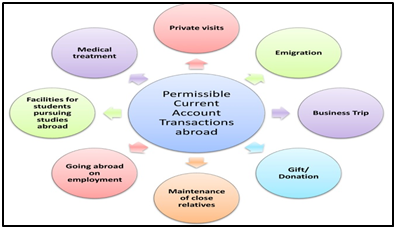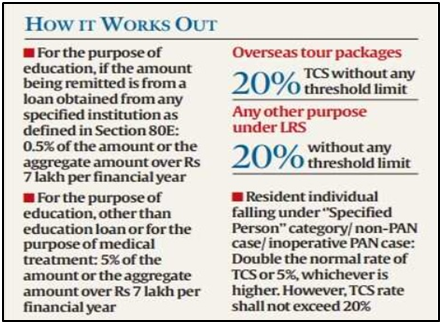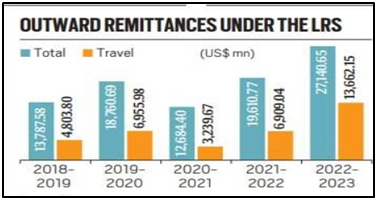Why in news?
- Starting from July 1, the Reserve Bank of India plans to implement a 20% tax on the Liberalised Remittances Scheme (LRS).
- As a result, banks are preparing their systems to monitor expenses made with international cards and collect the applicable tax on outward remittances.
What’s in today’s article?
- Liberalised Remittances Scheme (LRS)
- News Summary
What is Liberalised Remittance Scheme (LRS)?
- It was brought out by the RBI in 2004.
- It allows resident individuals to remit a certain amount of money during a financial year to another country for investment and expenditure.
- According to the prevailing regulations, resident individuals may remit up to $250,000 per financial year.
Background of LRS:
- Resident Indians or people resident in India are allowed to transfer foreign currency under the foreign exchange regulations.
- The transfer of foreign currency outside India is governed by the Foreign Exchange Management Act, 1999 (FEMA).
- Hence, to regulate transferring of funds within a specified limit, RBI brought the LRS.
Which transactions are allowed under the LRS?

- Apart from the areas highlighted in the above diagram, the remitted amount can also be invested in shares, debt instruments, and be used to buy immovable properties in overseas market.
- Individuals can also open, maintain and hold foreign currency accounts with banks outside India for carrying out transactions permitted under the scheme.
What are the Restrictions under LRS?
- LRS restricts
- buying and selling of foreign exchange abroad, or purchase of lottery tickets or sweep stakes, proscribed magazines and so on,
- or any items that are restricted under Schedule II of Foreign Exchange Management (Current Account Transactions) Rules, 2000.
- Also, one cannot make remittances directly or indirectly to countries identified by the Financial Action Task Force as non-co-operative countries and territories.
Recent Changes in LRS
- Announcement in Budget 2023-24
- Budget had proposed hiking the TCS rate to 20 per cent from 5 per cent above Rs 7 lakh threshold for all purposes other than education and medical treatment.
- Also, for overseas tour packages, the government had proposed hiking the TCS rate to 20 per cent from 5 per cent, without any threshold.
- Changes made
- May 2023, the Government amended rules under the FEMA to bring in international credit card spends outside India under the LRS.
- As a consequence, spending on international credit cards would have then attracted a higher rate of TCS (tax collected at source) at 20% from July 1.
- However, later, the government clarified that any payments by an individual using their international debit or credit cards up to Rs 7 lakh per financial year will be excluded from the LRS limits and hence, will not attract any TCS.
- TCS is a direct tax levy, which is collected by the seller of specified goods from the buyer and deposited to the government.
- TCS can be adjusted against the overall tax liability. It can be claimed as an income tax refund or a person can avail of credit while filing the ITR or calculating the advance taxes.
- It will not apply on the payments for purchase of foreign goods and services from India.

- Rationale behind new system
- Indians are now increasingly using credit and debit cards abroad instead of taking travellers cheques or forex cards.
- Until now, there is no estimate of money spent through cards abroad.
- The new system will enable the government to track high-value overseas transactions.
News Summary: Banks readying systems to track spends on outward remittances
Challenges faced by Banks in new regime
- Banks are facing difficulties in evaluating and collecting TCS exemptions for credit and debit card transactions conducted outside India.
- RBI has decided to leave it up to the banks to handle the collection of the tax imposed by the government in the FY23-24 budget.
- Deducting TCS is not a hassle. The hassle is to take into account certain exemptions into the system.
- The exemption of up to Rs 7 lakh created some confusion.
Outward remittances under LRS

- There was an outflow of $ 27.14 billion (over Rs 2.22 lakh crore) under the LRS route in FY23.












